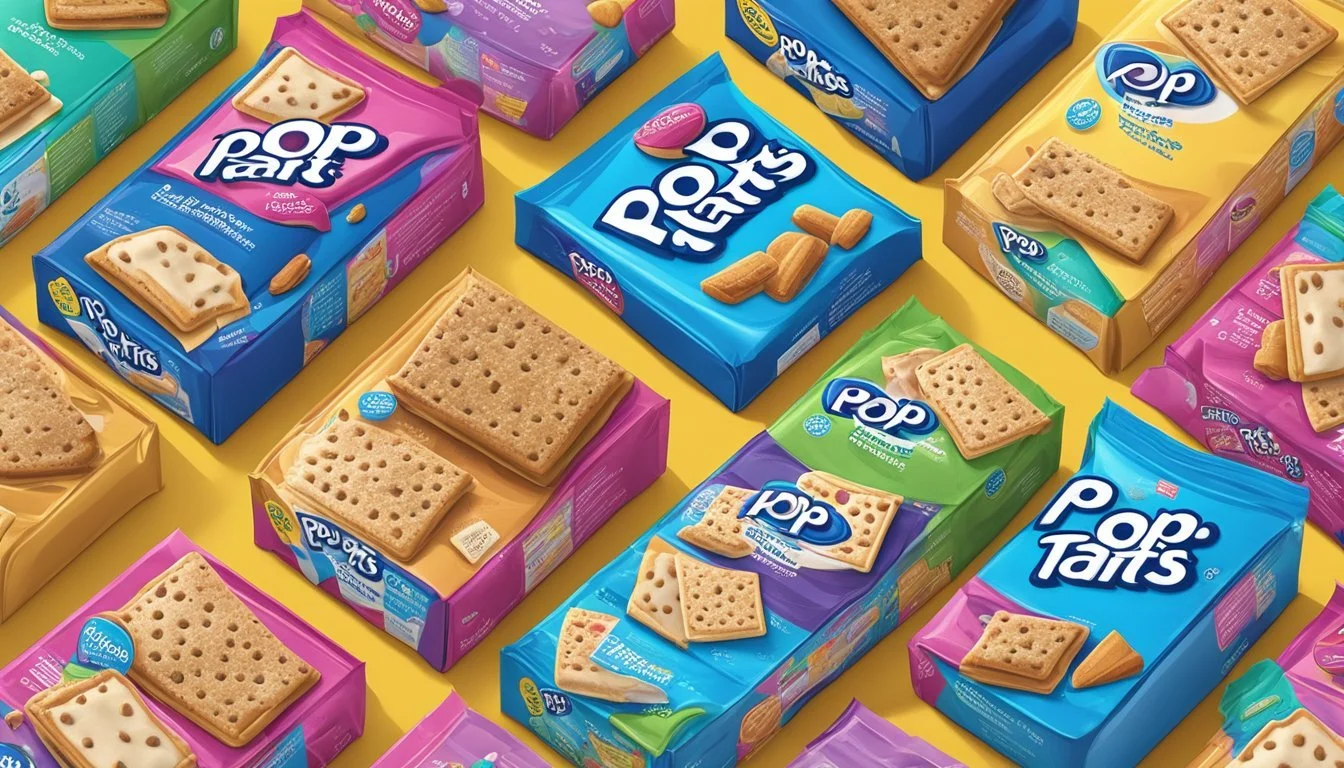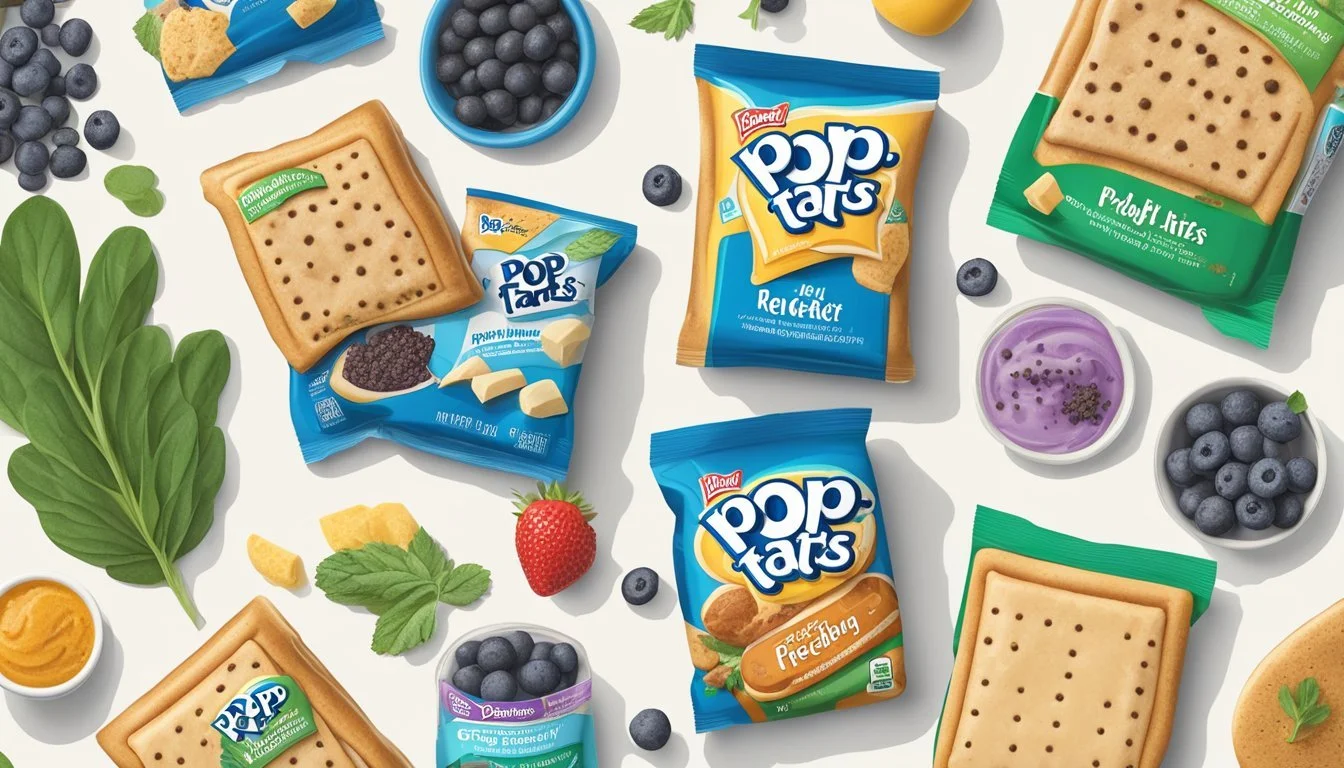Are Pop-Tarts Vegan?
Unveiling the Ingredients and Options
Pop-Tarts, the pre-packaged, ready-to-eat pastry, have been a beloved breakfast and snack item since their introduction in the 1960s. Marketed for their convenience and array of flavors, the question of whether Pop-Tarts align with a vegan lifestyle is not straightforward. A vegan diet excludes all animal products, including dairy, eggs, and honey. While the basic ingredients of Pop-Tarts, such as flour, sugar, and corn syrup, are plant-based, some flavors of Pop-Tarts incorporate additional ingredients that are not vegan-friendly.
Of particular interest to vegans are the unfrosted Pop-Tart varieties, which are more likely to refrain from animal-derived components. These include Unfrosted Strawberry, Unfrosted Blueberry, and Unfrosted Brown Sugar Cinnamon. Vegans who do not mind consuming palm oil, artificial colors, and natural flavors deemed vegan by their standards may consider these flavors suitable for their diet. Conversely, the frosted varieties present a different scenario as the frosting typically contains gelatin, a non-vegan ingredient derived from animal collagen.
In assessing Pop-Tarts' suitability for vegans, it's critical to scrutinize the ingredient list of each flavor. Gelatin appears in many frosted Pop-Tarts, rendering them unsuitable for a vegan diet. Moreover, some themed flavors may contain dairy or other animal derivatives, further limiting the range of vegan options. It is always advised that individuals adhere to strict ingredient analysis to ensure compliance with their vegan dietary choices when considering processed food items such as Pop-Tarts.
Pop-Tarts Overview
This section explores the history and widespread appeal of Pop-Tarts, alongside a detailed look at their various flavors.
Origins and Popularity
Pop-Tarts were introduced by Kellogg's in 1964 as a quick, easy-to-prepare, and portable pastry option for breakfast. Originally, Pop-Tarts came without frosting; today, they are commonly consumed after being heated in a toaster. Their convenience and taste quickly made them a favorite, leading to an iconic status within American breakfast culture. With sales surpassing 2 billion Pop-Tarts a year, their popularity continues to stand the test of time.
Varieties and Flavors
Over the years, Kellogg's has expanded the Pop-Tarts lineup to include a multitude of flavors, catering to a variety of taste preferences. The flavors of Pop-Tarts fall into two primary categories: frosted and unfrosted.
Frosted Varieties:
Frosted Blueberry
Frosted Brown Sugar Cinnamon
Cherry
Hot Fudge Sundae
Wild Berry
Cookie Dough
Cinnamon Roll
Unfrosted Varieties:
Unfrosted Blueberry
Unfrosted Strawberry
Unfrosted Brown Sugar Cinnamon
Chocolate Chip
The frosted varieties typically have a sweet glaze on top, while the unfrosted versions lack this extra layer of sugar. Among the numerous flavors, some, like the frosted blueberry, chocolate fudge, and cinnamon roll, have become particularly cherished treats. However, it's worth noting that the inclusion of ingredients such as gelatin in the frosting of many varieties renders them unsuitable for those adhering to a vegan diet. Conversely, certain unfrosted versions such as blueberry, strawberry, and brown sugar cinnamon are typically free from animal-derived ingredients.
Understanding Veganism
Veganism is a dietary and lifestyle choice that involves abstaining from the use of animal products. It is based on principles that prioritize health, ethics, and often environmental concerns.
Vegan Diet Fundamentals
A vegan diet consists entirely of plant-based foods. This means that individuals following a vegan diet avoid all animal products, including dairy, eggs, meat, and by-products like honey and gelatin. The core components of a vegan diet typically include:
Fruits and Vegetables: A wide variety of fresh, frozen, or canned.
Legumes: Beans, lentils, and chickpeas.
Nuts and Seeds: Including nut butters and plant-based milks.
Grains: Whole grains such as brown rice, quinoa, oats, and whole wheat bread.
Enthusiasts assert that a well-planned vegan diet supports good health by providing all the necessary nutrients while simultaneously reducing the risk of certain medical conditions.
Health and Ethical Considerations
Health considerations are central for many adopting a vegan lifestyle, with a focus on reducing the intake of saturated fats linked to heart disease and improving overall nutrient intake. Scientific studies often associate vegan diets with lower blood pressure and cholesterol levels, a decreased risk of type 2 diabetes, and a tendency towards a healthier body weight.
The ethical aspect of veganism lies in the opposition to the exploitation and harm of animals. Vegans often aim to decrease animal suffering and the environmental impact associated with factory farming and animal agriculture. This includes issues like deforestation for grazing land or growing feed crops, and the substantial carbon footprint of meat production.
By making informed choices and considering the implications of one's diet on health, ethical, and environmental fronts, the vegan diet presents itself as a holistic approach to living that many find meaningful and sustainable.
Ingredients Analysis
Evaluating the ingredients in Pop-Tarts provides crucial insights for vegans seeking to know which products align with their dietary choices. This analysis will scrutinize the various components that are non-vegan, controversial, and the vegan alternatives that Pop-Tarts offer.
Common Non-Vegan Ingredients in Pop-Tarts
Gelatin: Derived from animal collagen, gelatin is commonly found in the frosted varieties of Pop-Tarts.
Milk Derivatives: Ingredients such as milk or whey are prevalent in many flavors, making them unsuitable for vegans.
Egg Whites: Some varieties use egg whites, another clear non-vegan ingredient.
Controversial Ingredients
Sugar: The use of bone char in refining sugar can be contentious. While sugar itself is plant-derived, the refining process may involve animal products.
Palm Oil: Though plant-based, palm oil's inclusion is debated due to environmental concerns and the impact on animal habitats.
Natural and Artificial Flavors: Determining whether these flavors are vegan can be complicated without specific disclosures from manufacturers.
Food Dyes (such as Blue 1, Red 40): Controversy arises due to the ethical concerns around animal testing.
High Fructose Corn Syrup: A vegan ingredient, but its health effects are often under scrutiny.
Vegan Alternatives in Pop-Tarts
Unfrosted Strawberry: It does not include animal-derived ingredients.
Unfrosted Blueberry: Similarly, this flavor avoids the use of non-vegan components.
Unfrosted Brown Sugar Cinnamon: Another option that excludes gelatin and dairy derivatives.
Illustration of vegan-friendly Pop-Tarts:
Flavor Gelatin-Free Dairy-Free Egg-Free Unfrosted Strawberry ✓ ✓ ✓ Unfrosted Blueberry ✓ ✓ ✓ Unfrosted Brown Sugar Cinnamon ✓ ✓ ✓
These alternatives indicate that while many Pop-Tarts contain animal products, there are select flavors that cater to a vegan diet.
Veganism and Pop-Tarts
When assessing Pop-Tarts in the context of a vegan diet, it's crucial to examine the ingredients in each variety. Frosted Pop-Tarts contain animal-derived ingredients, making them unsuitable for vegans, while certain unfrosted flavors may be vegan-friendly.
Vegan Varieties of Pop-Tarts
Available evidence suggests that unfrosted flavors such as Unfrosted Strawberry, Unfrosted Blueberry, and Unfrosted Brown Sugar Cinnamon might be suitable for those following a vegan lifestyle. These flavors do not contain gelatin or dairy products, which are common non-vegan ingredients in the frosted varieties.
Pop-Tarts and Dietary Restrictions
Individuals with dietary restrictions seek products that align with their needs. For vegans, this means avoiding all animal products. However, even some unfrosted Pop-Tarts may need closer inspection for other potentially non-vegan ingredients or controversial additives. Furthermore, dietary restrictions can extend beyond veganism, and individuals may also need to consider if they are looking for gluten-free or free from other allergens which Pop-Tarts may not accommodate.
Challenges in Finding Vegan Pop-Tarts
Identifying truly vegan Pop-Tarts can be a challenge in a conventional grocery store. Some ingredients in Pop-Tarts, such as mono- and diglycerides, can be derived from animal sources, making it important for consumers to verify the source if they follow a strict vegan diet. Additionally, cross-contamination with non-vegan products during manufacturing can be a concern for some individuals observing strict dietary protocols.
Beyond Pop-Tarts
While Pop-Tarts offer some vegan options, many flavors contain animal-derived ingredients such as gelatin. Consumers seeking vegan-friendly toaster pastries can explore homemade recipes or commercial brands committed to purely plant-based ingredients. These alternatives cater to the vegan diet, highlighting the evolving demand for health-conscious and environmentally sustainable treats.
Homemade Vegan Toaster Pastries
Creating homemade vegan toaster pastries allows for complete control over the ingredients, ensuring they meet vegan standards and personal health preferences. Homemade pastries eliminate the risk of hidden animal derivatives and provide the opportunity to use organic and non-GMO ingredients, reducing the impact on deforestation and other environmental issues. Recipes for these pastries vary, but common vegan ingredients include vegan pastry dough, plant-based fillers for flavor, and natural sweeteners.
Commercial Vegan Toaster Pastry Brands
Several commercial brands have emerged to fill the gap in the market for ready-to-eat vegan toaster pastries. One notable brand is Bobo's, which offers a variety of vegan-friendly options free from animal products. These alternatives are not only cruelty-free but often come with improved nutritional profiles, catering to health-conscious consumers and those looking to reduce their environmental footprint.
The Future of Vegan Treats
The landscape for vegan treats, including toaster pastries, is expanding as consumer awareness of health risks associated with animal products grows. In line with this trend, brands are increasingly prioritizing vegan-friendly and nutritionally beneficial alternatives. This progress indicates a promising future for those following a vegan diet—one that doesn't compromise on taste or convenience but embraces health and the well-being of the planet.
Conclusion
Pop-Tarts, the iconic breakfast pastry, present a challenge for individuals adhering to a vegan diet. It is important to note that most Pop-Tarts are not vegan-friendly. Common non-vegan ingredients found in many flavors include milk derivatives, whey, and gelatin. These ingredients are primarily found in the frosted varieties of Pop-Tarts, which comprise a large part of the product line.
However, there are select flavors of Pop-Tarts without frosting that are devoid of animal-based ingredients. These include:
Unfrosted Strawberry
Unfrosted Blueberry
Unfrosted Brown Sugar Cinnamon
Individuals following a vegan lifestyle must also consider the presence of palm oil and refined white sugar in Pop-Tarts. While these ingredients are plant-based, they may not align with certain ethical standards due to environmental concerns and processing methods involving animal bone char.
For those seeking alternatives, the market offers vegan breakfast pastries that are specifically designed to meet ethical and health considerations. Such alternatives may provide a wider variety of flavors and nutritional benefits, better aligning with the dietary requirements and ethical values of vegans.
In summary, the vegan status of Pop-Tarts is mixed, and vegans should examine ingredients closely, keeping ethical considerations in mind when selecting their breakfast foods.






